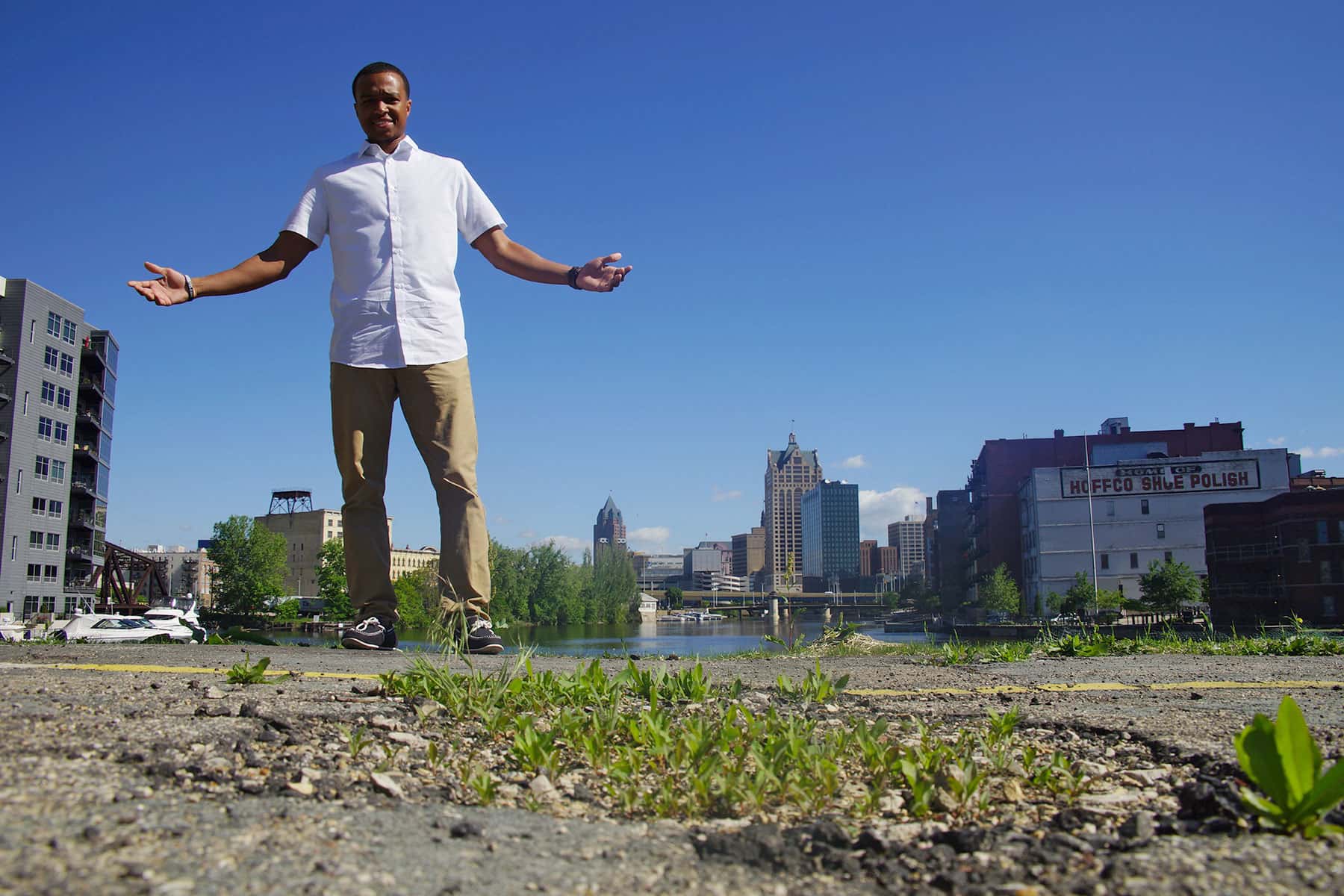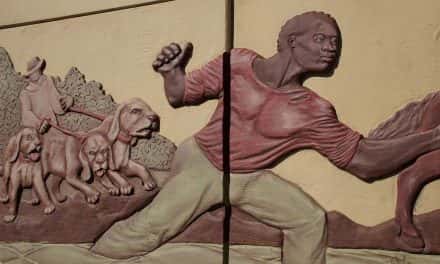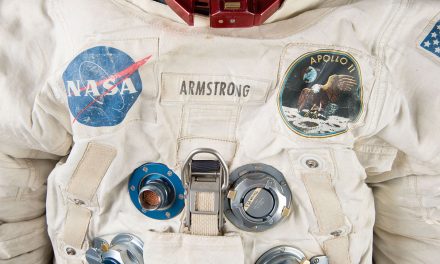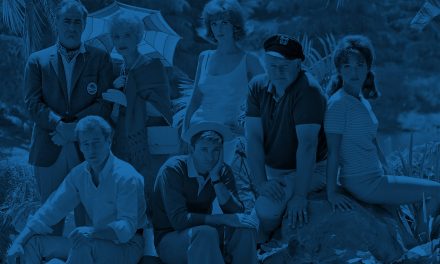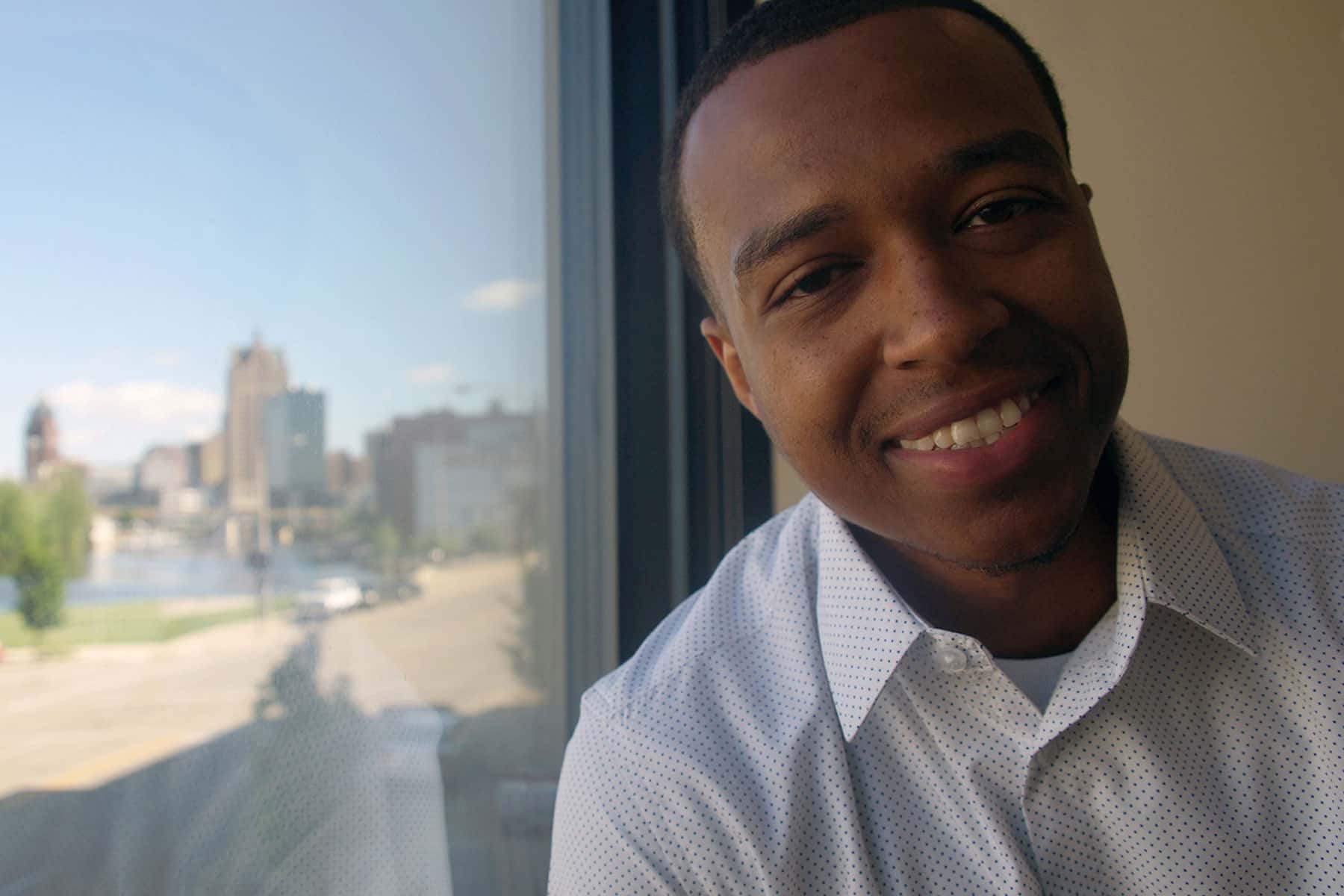
Known more for his athletic achievements on the basketball court in high school and college, Khalif El-Amin is challenging the social values placed on sports, changing the perception of what an entrepreneur is in Milwaukee, and proving that young African Americans have a place in the tech startup industry.
Q&A with Khalif El-Amin
Milwaukee Independent: What experience or individual was the biggest influence on your youth? And what was the biggest lesson you learned from your father Saleem?
Khalif El-Amin: Seeing people like my mother, father, and grandparents work so hard day in and day out, it just became something I was accustomed to being around. It was second nature to me. The biggest lesson I’ve learned from my father is that you’re not truly a human being until you love for your brother and sister what you love for yourself.
Milwaukee Independent: Why are your entrepreneurial achievements in business not celebrated in the same way as your sports record was for winning in basketball?
Khalif El-Amin: This is something that I’ve thought about over the years. Too often people get caught up in the glitz and glamour of instant gratification, and forget what their purpose is and what really got them to that point. The older I become, the more I want to stay low key and just do the work that I’m so passionate about completing.
Milwaukee Independent: You were involved in the organization DRIVE, can you explain what it is and what motivated you to become involved in their program?
Khalif El-Amin: DRIVE is a non-profit dedicated to helping at-risk, inner-city youth by providing personalized performance training and mentoring programs to enhance athletic ability, encourage healthier lifestyle choices, and promote personal growth. I’ve known Mike Lee and his family for over 10 years. I became intrigued with his passion and attention to detail while doing skill development training. So when presented with the opportunity to become apart of this organization that not only included basketball, but giving back to the community, it was a no-brainer to join.
Milwaukee Independent: You and your brother both have university degrees, and Que also has a Master’s Degree, so what did the opportunity for higher education mean to you and your family?
Khalif El-Amin: It meant a lot to me and my family. We are very fortunate that all of our aunts and uncles, on both sides of the family, have college degrees, including a majority of college-educated cousins too. I think we are very lucky to be apart of the family we are in because everyone motivates and holds each other accountable, personally and professionally.
Milwaukee Independent: What is the dynamic of working with your brother Que like?
Khalif El-Amin: The dynamic of working with Que is absolutely amazing. It is truly a blessing to be able to work with, learn from, and become professionally successful with my older brother who I’ve looked up to for as long as I can remember. He has taught me so much about everything, I could never thank him enough.
Milwaukee Independent: Even with your brilliant academic and athletic achievements, what is your biggest frustration in Milwaukee when people first react to the color or your skin?
Khalif El-Amin: The biggest frustration is the automatic assumption and judgment that is placed on me, because of what others see in the media and their lack of knowledge of who I really am.
Milwaukee Independent: On paper, your skills and experience rival your peers, so has the spelling of your name ever disqualified you from opportunities?
Khalif El-Amin: In a time when we have a president named Barack Obama, I would hope that my name would not have unfairly prevented my access to opportunities. Even if it has, I put the responsibility on myself, that I was not able to project a favorable image past any preconceived notions associated with my name.
Milwaukee Independent: Do you feel the news media should focus less on national role models like Oprah Winfrey or LeBron James and instead tell more stories about parents in the local community who are making a difference?
Khalif El-Amin: The media is in the business to sell advertising, and people like to hear about national role more than local stories. So I think it is more on us as the local community to highlight those who are making a difference. There are some local media sources such as Milwaukee Independent and Milwaukee Neighborhood News who are stepping up and meeting this challenge.
Milwaukee Independent: Is faith a part of your life, and if so how is it a part of work?
Khalif El-Amin: Yes, it plays a huge role. I don’t necessarily wear it on my sleeve, so to speak. But I know that there is a God that controls all things and if something is in his will, it will be. Que and I acknowledge that God is continually blessing us, and when things do get tough we know that God does not put a burden on us greater than we can bear.
Milwaukee Independent: Because Milwaukee has a manufacturing mentality that thinks constructing new buildings shows it is modern, what suggestions do you have to make progress in changing social behaviors that are still stuck in the Civil Rights era?
Khalif El-Amin: “Being the change that we want to see happen” is what I believe as the only real way to make progress. So instead of complaining or criticizing, invest in the community, teach a young person a skill, have greater racial tolerance, or just be a nice person.
Milwaukee Independent: When you co-founded the Young Enterprising Society (¥€$), in part as a way to help the city of Milwaukee overcome the problems of African-American unemployment, what were your measurements for success? And are you on track to reaching these goals?
Khalif El-Amin: We founded YES as a way to mobilize the resources that we benefited from, as a way to help the larger community. Our skills in working with businesses were part of that mission. We dd not have a specific measure of success because unemployment, especially in Milwaukee, is a larger problem that we are not directly tracking. Our goal is to assemble tools for support, and we are on track with that as evidenced by being able to bring information, investment, and attention to our associates.
Milwaukee Independent: How did you get funding for your WERCBench JV program through the Wisconsin Housing and Economic Development Authority (WHEDA)? And what was your experience like to meet with Wyman B. Winston?
Khalif El-Amin: To secure funding, we just applied to the WHEDA grant program and was blessed enough to receive funding. Through that process I was fortunate to get to know Mr. Winston, who had for so long impressed me by his keen intelligence and ability to effectively project WHEDA’s vision.
Milwaukee Independent: Can you explain your involvement with WERCBench JV and how it focuses on STEAM (science, technology, engineering, art and math).
Khalif El-Amin: I work heavily in coordinating the logistics for the YES STEAM Program, which include scheduling, payroll, compliance, reporting ,and every other aspect that may develop. The workshops and summer program exposes students to the latest technologies, such as the Raspberry Pi micro computer, augmented and virtual reality, online sales, digital design, physical mechanics, aerial drones, and such that encompasses STEAM, but in real world examples that the children are excited about learning about.
Milwaukee Independent: How can technology startups ever thrive in a risk-averse culture like Milwaukee?
Khalif El-Amin: That is hard question. Building a strong network inside and outside of Milwaukee is a major key. If a tech startup can master their craft here then it is easy for them to sell their products outside of Milwaukee, or even get investment outside of Milwaukee. A group of early 20 year olds came to our office recently. They own an AR/VR gaming company and they are currently selling their virtual reality games to major video game distributors. This is just one example, but as a tech company they did not rely on Milwaukee as the only market to sell their product.
Milwaukee Independent: What is your hope for the City of Milwaukee, and why do you choose to live here instead of moving to an environment that is more racially diverse and supporting of startups?
Khalif El-Amin: I choose to live here because this is where I call home and the city needs all our help. We have to stay focused and keep building on what we have established. This question actually reminded me of a quote one of my good friends said, “If you can make it in Milwaukee, you can make it anywhere.” I will add that, in life we should always move where we will have the most positive impact. Que told me he heard Dr. Michael Lovell of Marquette University say this.

